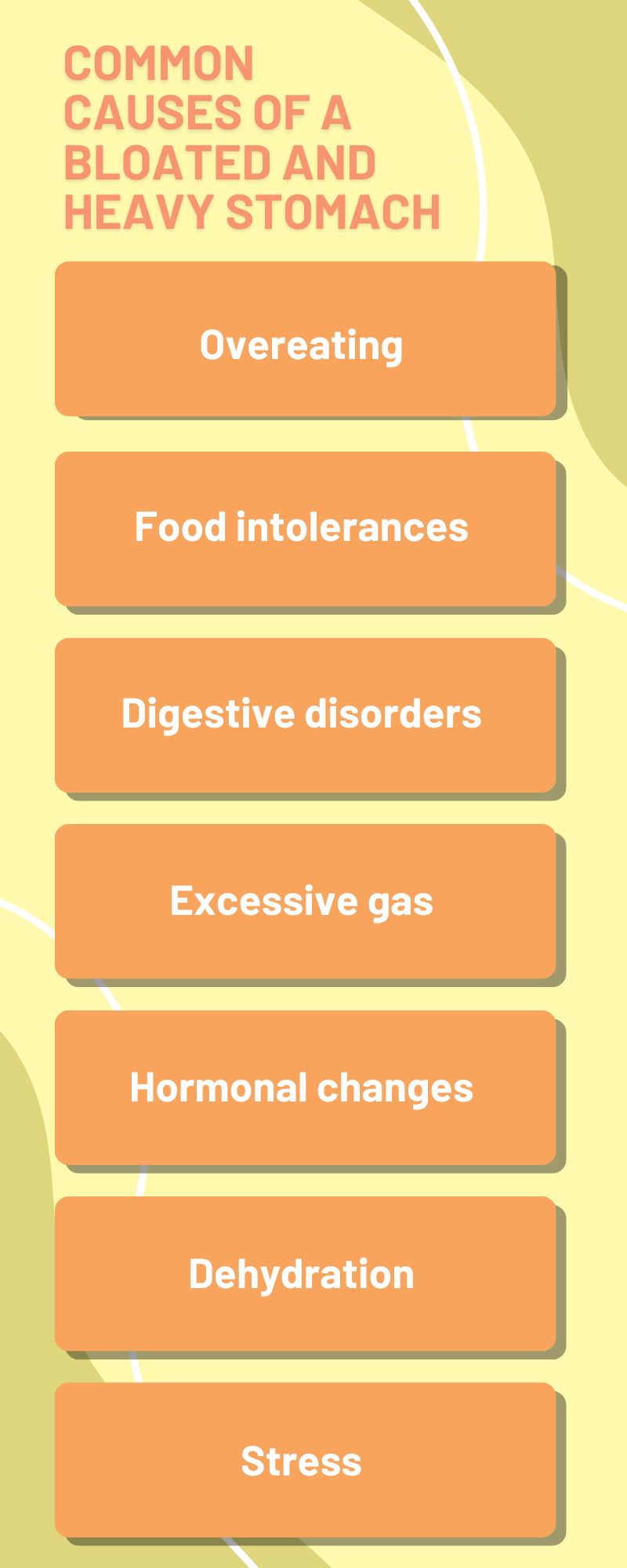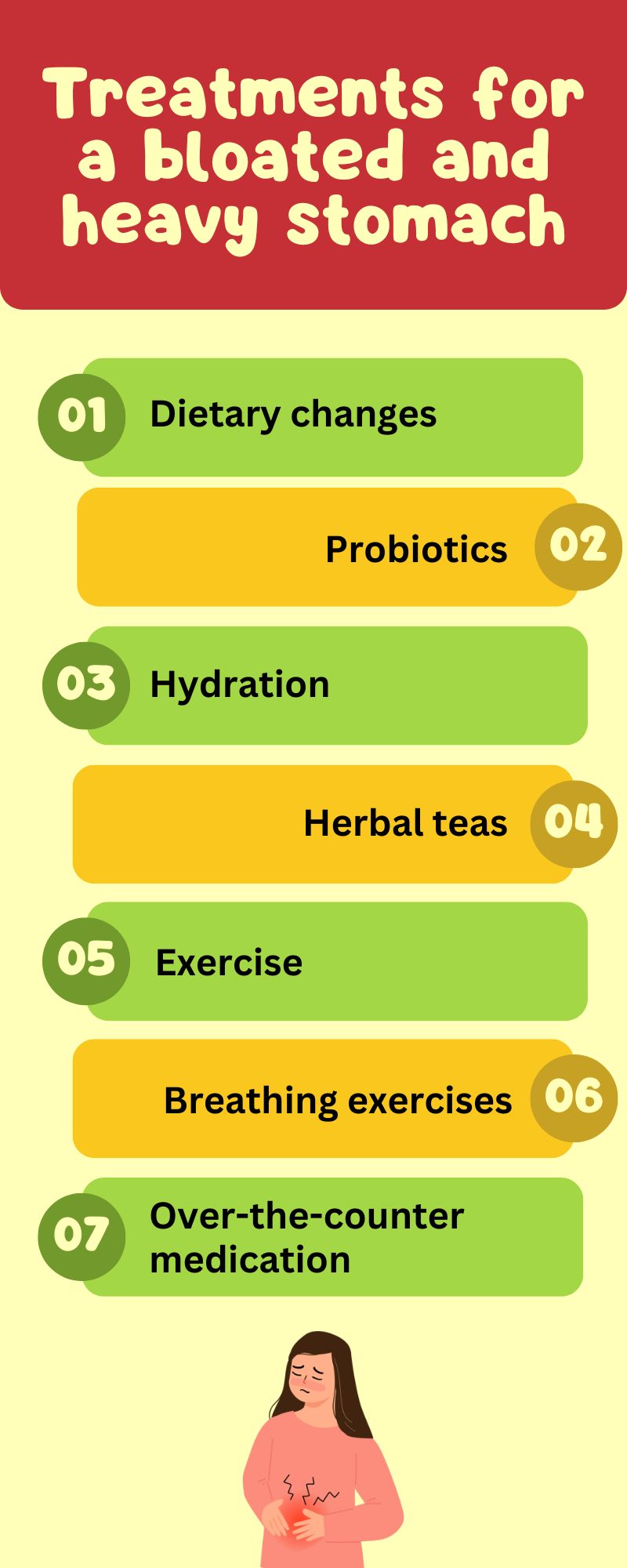TL;DR
-
Bloating and a heavy stomach can be caused by overeating, food intolerances, stress, or digestive disorders
-
Common remedies include adjusting your diet, staying hydrated, and adding probiotics
-
Herbal teas like peppermint and ginger, along with light exercise, help reduce bloating
-
Over-the-counter medications can offer temporary relief, but long-term solutions involve lifestyle changes
-
Prevention is key: eat smaller meals, avoid swallowing air, and manage stress to prevent bloating
Have you ever felt that uncomfortable heaviness in your stomach after a meal, or noticed bloating that won’t go away? Maybe it’s after a large dinner or even when you haven’t eaten that much, but your stomach feels full, tight, and heavy. If you’re constantly wondering, "Why does my stomach feel heavy?" - you’re not alone.
Digestive issues like bloating and a heavy stomach are common, but they don’t have to control your day. Whether it’s occasional discomfort or a recurring problem, it’s frustrating to feel this way, and you’re probably searching for ways to feel lighter and more comfortable.
The good news is, you don’t have to accept it. There are effective ways to treat bloating and manage that heavy feeling in your stomach. In this blog, we’ll break down the common causes of a bloated stomach and share practical solutions to help you feel better.
Let’s understand and take control of your digestive health!
What is bloating?
Bloating refers to the feeling of fullness or pressure in your stomach, often accompanied by visible swelling. It happens when your stomach or intestines are filled with gas or air. While occasional bloating is common, frequent bloating can be a sign of digestive distress. Understanding bloating is the first step toward finding effective treatments.
Key symptoms of bloating include:
-
Abdominal discomfort
-
A feeling of fullness or heaviness
-
Swelling in the stomach area
Bloating can result from food choices, digestion issues, or other health conditions.
Let’s explore the main causes next.
Common causes of a bloated and heavy stomach

A bloated and heavy stomach doesn’t always result from overeating. Even small meals or seemingly harmless habits can lead to discomfort. Understanding the underlying causes can help you manage and alleviate the issue more effectively.
Here are some common triggers:
-
Overeating
Consuming large portions or eating too quickly can cause the stomach to stretch, leading to bloating. This overwhelms your digestive system and slows down digestion. Eating smaller, more frequent meals can help reduce the chances of bloating.
-
Food intolerances
Lactose, gluten, and other food sensitivities can cause bloating as your body struggles to digest certain ingredients. If you’re sensitive to these foods, it can lead to gas, discomfort, and heaviness. Identifying and avoiding these triggers is key to managing bloating.
-
Digestive disorders
Conditions like Irritable Bowel Syndrome (IBS) and Gastroesophageal Reflux Disease (GERD) often contribute to chronic bloating and a heavy stomach. These disorders can disrupt digestion, leading to frequent discomfort. Managing these conditions through proper medical care can help alleviate symptoms.
-
Excessive gas
Certain foods, such as beans, cruciferous vegetables, and carbonated drinks, can produce excess gas during digestion. This buildup can cause bloating and abdominal pressure. Reducing these foods in your diet can help keep bloating at bay.
-
Hormonal changes
Fluctuating hormones, especially during menstruation, pregnancy, or menopause, can lead to water retention and digestive discomfort. Many women experience bloating and heaviness as a result of these hormonal shifts. Understanding and managing these changes can help reduce bloating.
-
Dehydration
When you don’t drink enough water, your body retains fluid, leading to bloating and a feeling of fullness. Proper hydration supports digestion and helps reduce water retention. Aim for adequate water intake to keep your digestive system running smoothly.
-
Stress
Stress can significantly affect digestion, leading to symptoms like bloating, indigestion, and gas. Anxiety triggers the release of stress hormones, which slow down digestion and may contribute to discomfort. Finding ways to manage stress through deep breathing, exercise, or relaxation can alleviate bloating.
If you're experiencing discomfort in your stomach, one of these common causes could be behind it.
If you’re looking for extra support to keep your gut healthy and relieve bloating, check out Gut Cleanse | 14 Prebiotic Colon Detox Shots. These detox shots help eliminate waste buildup, reduce bloating, and support your gut health.
Let’s now look at treatments that can help relieve this discomfort.
Treatments for a bloated and heavy stomach

If bloating and stomach heaviness are regular issues for you, there are several strategies to help ease the discomfort and support your digestive health. Let’s take a look at some effective treatments:
-
Dietary changes
The foods you eat play a significant role in bloating. Avoid common trigger foods like processed foods, beans, carbonated drinks, and dairy. These foods can cause gas and bloating. Instead, focus on foods that promote digestion, such as ginger, mint, and yogurt. These help soothe the stomach and keep digestion running smoothly.
-
Probiotics
Incorporating probiotics into your diet can help balance your gut bacteria, which is key for good digestion. Consider probiotic-rich foods like kefir, yogurt, sauerkraut, or taking probiotic supplements. These can help replenish beneficial bacteria in your gut, reduce bloating, and promote better digestion.
-
Hydration
Drinking enough water throughout the day is essential for good digestion and reducing bloating. Water helps to prevent water retention, which often contributes to bloating. Staying hydrated supports the digestive system and helps flush out excess sodium, reducing swelling and heaviness.
-
Herbal teas
Certain herbal teas like peppermint, ginger, and chamomile are known for their ability to calm the digestive system and reduce bloating. These teas can be incredibly soothing for the stomach, helping to ease discomfort and promote better digestion after meals.
-
Exercise
Physical activity can significantly help reduce bloating and improve overall digestion. Even a simple walk after meals can stimulate digestion and relieve trapped gas. Regular exercise also supports your digestive system and reduces the chances of constipation, which can contribute to bloating.
-
Breathing exercises
Stress can slow down your digestive system and contribute to bloating. Practicing deep breathing exercises can help relax the body and reduce stress, easing bloating caused by anxiety. Deep breathing encourages better digestion and can help reduce any tension in the abdominal area.
-
Over-the-counter medication
For immediate relief from bloating and gas, you can try over-the-counter medications like antacids, simethicone, or activated charcoal. These can help break down gas bubbles in the stomach and alleviate the discomfort caused by bloating.
Including these simple yet effective treatments in your daily routine can help prevent bloating and discomfort from becoming a regular part of your life.
We’re all foodies at heart, and sometimes those pizza cravings hit hard. But we all know the bloated feeling that can follow. If you’re tired of that post-meal discomfort, check out our blog on How to Say Bye to Bloating After Eating Pizza for tips on managing bloating and keeping your stomach happy.
As the saying goes, prevention is better than cure, let’s take a look at some tips that can help you avoid a heavy stomach and bloating in the future.
Preventative measures for a heavy stomach
Preventing bloating and discomfort is all about adopting healthier eating and lifestyle habits. Here are some tips to help you avoid the feeling of a heavy stomach in the future:
-
Eat smaller meals: Large meals can overload your digestive system, leading to bloating. Opt for smaller quantities and more frequent meals throughout the day
-
Avoid swallowing air: When you eat too quickly or chew gum, you may swallow air, which can result in bloating
-
Mindful eating: Take your time while eating and chew food thoroughly to help with digestion
-
Stay active: Regular exercise promotes healthy digestion and helps prevent bloating
-
Track your food: Keep a food diary to identify any foods that might trigger bloating
Adopting these habits can help minimize the chances of experiencing bloating and heaviness.
Boost your digestion and say goodbye to indigestion! Watch this video to understand the benefits of Gut Balance Probiotics | The Good Bug and how our Gut Balance Probiotic SuperGut Stick can help balance your gut flora for better digestion and overall health.
Let’s discuss when it’s time to seek medical help.
When to seek medical help
While bloating is usually harmless, there are times when it could be a sign of something more serious. Seek medical advice if you experience any of the following:
-
Persistent bloating: If bloating lasts for several days or is constant, it could be a sign of a digestive issue or other health condition
-
Severe pain: Intense pain or cramping along with bloating should be evaluated by a doctor
-
Unexplained weight loss: If you notice weight loss along with bloating, seek medical advice
-
Blood in vomit or stool: This could be a serious condition, like ulcers or gastrointestinal bleeding
-
Frequent heartburn: If you have persistent acid reflux or heartburn with bloating, it may require treatment
If you experience any of these symptoms, it’s important to see a healthcare professional for a proper diagnosis.
Dealing with a bloated and heavy stomach can be frustrating and sometimes painful, but understanding the root cause and knowing how to treat it can help you feel more comfortable. Whether it's adjusting your diet, adding probiotics, or practicing mindful eating, you have options to ease the discomfort and prevent it from recurring.
Ready to take control of your gut health? Start by incorporating some of the treatments and preventative measures we've discussed. For added support, explore The Good Bug products, which can help boost your digestive health and relieve bloating.
Frequently Asked Questions (FAQs)
-
How to relieve a heavy and bloated stomach?
To relieve a heavy and bloated stomach, focus on gentle remedies like drinking water, herbal teas, or incorporating probiotics into your diet. Avoid large meals, eat smaller portions, and try including light exercise like walking to help move gas and ease discomfort.
-
Why does my stomach feel heavy and bloated?
A heavy and bloated stomach can be caused by overeating, food intolerances, digestive disorders like IBS, hormonal changes, dehydration, and stress. Identifying the underlying cause is key to finding relief.
-
What is the best supplement for bloating?
Probiotics are one of the best supplements to reduce bloating, as they help restore balance to your gut microbiome. The Good Bug offers a variety of probiotics that promote digestion and ease bloating. Additionally, Metabolically Lean supports digestion and helps manage hunger, while Gut Cleanse Detox Shots can help flush out toxins and reduce bloating over time.
-
What home remedies work for bloating?
For quick relief from bloating, try home remedies such as drinking ginger or peppermint tea, consuming apple cider vinegar with warm water, or eating smaller meals throughout the day. Yoga poses or a gentle walk can also help relieve trapped gas.



